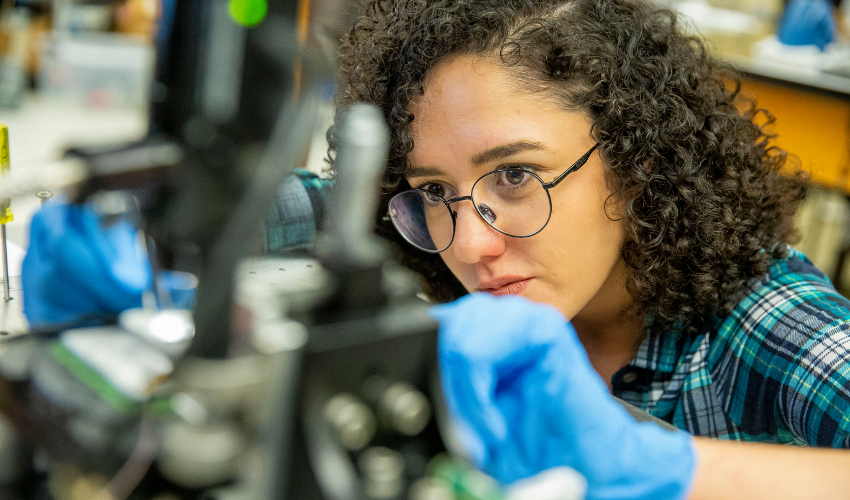$2 million in grants to deliver cutting-edge equipment for student research

Master’s student Viviane Costa, working in the lab of Associate Professor of Physics and Astronomy AKM Newaz
Funding will let SF State students gain experience in machine learning, cellular engineering and more
These might be trying economic times for higher education, but faculty members in the San Francisco State University College of Science & Engineering are going out of their way to ensure that students have access to world-class research experiences that will prepare them for their careers. Three recent grants, totaling more than $2 million, will allow more students to conduct research in futuristic fields like machine learning, cellular engineering and robotics.
“We wanted research training at San Francisco State to be as up-to-date as possible,” said Professor of Biology Diana Chu. “We’re working actively to push the boundaries of the scientific research that we can do here at SF State.”
Chu led the effort to obtain a new $750,000 grant from the National Science Foundation (NSF) to purchase a state-of-the art microscope that can capture clear images all the way down to the scale of individual cells, even tracking what’s going on inside them over time. The equipment will be used by more than 100 student researchers from biology to chemistry to physics each year, replacing a decade-old microscope. “We trained hundreds and hundreds of students with that microscope,” Chu explained, but the rapid pace of technology in the field means it’s already on the brink of being outdated.
Getting the funding for equipment like this often takes years of painstaking behind-the-scenes work. But for professors like Chu, that effort is justified by the result: the chance to give students research experience to prepare them for Ph.D. programs and positions in industry. “This instrument really allows us to have students develop those skills and then showcase those skills so that they are as competitive as anyone else,” Chu explained. That work can also open doors for students during their time at SF State. One plan for the microscope is for students to analyze the resulting data alongside IBM scientists, part of the multi-institution Center for Cellular Construction.
Professor of Computer Engineering Hamid Mahmoodi was the lead on obtaining two other grants. One comes from a U.S. Department of Defense program aimed at increasing representation in science and engineering fields by supporting minority-serving institutions. The $600,000 in funding will let the University acquire a Swiss army knife of a tool that can test electronic circuits and measure and monitor a variety of electronic and digital signals, making it useful for everything from troubleshooting computer chips that are specialized to run futuristic machine-learning programs to testing the properties of super-thin materials.
“The areas I can list include hardware security, security of integrated circuits, hardware for machine learning and artificial intelligence, and research in physics in the area of photonics,” Mahmoodi said. His own plan for the equipment? To test methods to secure sensitive computer hardware so it can safely be produced overseas. “We’re working on techniques to secure the design of integrative circuits against reverse engineering, against overproduction, cloning, counterfeiting and piracy,” he explained.
Students will be able to take advantage of this equipment, too — in this case, those who are working on their senior design projects. “These are applied projects where the use of such measurement capability is typically very helpful,” Mahmoodi said. The other grant he led, a $750,000 NSF grant to obtain equipment that can test other types of electric circuits, will be used for a number of areas of engineering, including cutting-edge work on robotics, prosthetics and wearable technologies.
It’s not just faculty members who get excited by new research equipment. Viviane Costa, a master’s student in the Department of Physics and Astronomy who took second place in the CSU’s 2020 Student Research Competition in the category of graduate physics, will soon begin using tools obtained through an earlier NSF grant led by her advisor, Associate Professor of Physics and Astronomy AKM Newaz. The equipment will allow her to push her thesis research to new extremes, measuring the properties of super-thin materials under powerful magnetic fields and at temperatures just barely above absolute zero.
“Now we don’t have to go to Stanford, we don’t have to go to Berkeley,” Costa explained. “It’s right here. It’s ours.”